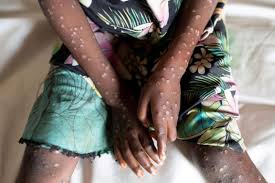The Africa Centre for Disease Control and Prevention (Africa CDC) has officially declared the monkeypox outbreak a public health emergency of continental security.
This marks the first time the organisation has issued such a declaration, highlighting the severity of the situation.
Urgent Call to Action
Africa CDC Director General, Jean Kaseya, announced on Tuesday, stressing the need for immediate and effective action against the rapidly spreading disease, formerly known as monkeypox.
“The situation is alarming, and we cannot afford to wait. We have seen an increase in cases, and the virus is spreading rapidly across the continent.
We need to act now to prevent further spread and protect our citizens,” Kaseya emphasized during a media briefing.
Rising Cases and New Variant
This declaration follows a recent spike in monkeypox cases across Africa, with over 2,000 new infections reported in 13 affected countries within the past week.
The outbreak is driven by a new variant of the virus, Clade 1b, which has spread from the eastern Democratic Republic of Congo (DRC).
Prof. Salim Abdool Karim, chairperson of the Emergency Consultative Group, described the new variant as ‘highly contagious with a high fatality rate’.
Comprehensive Consultative Process
Kaseya highlighted that the decision to declare the emergency was not made lightly but was the result of a comprehensive consultative process involving over 600 individuals.
“Africa CDC did not sit in its office and make a decision. It was a constructive, consultative process led at various levels by capable people. At least 600 people were reached to discuss data, evidence, and strategies for this outbreak,” Kaseya explained.
Challenges in Managing the Outbreak
Kaseya acknowledged several challenges in managing the outbreak, including insecurity, limited understanding of transmission dynamics, inadequate global attention, and the lack of countermeasures.
“We are facing a complex situation and need a coordinated approach to address it,” Kaseya added.
“We need to work together with our partners, including the World Health Organisation (WHO), to ensure a robust response.”
Vaccine Shortage and Local Manufacturing
One significant challenge is the limited availability of monkeypox vaccines. Currently, only 200,000 doses are available, far short of the 10 million that are needed.
Kaseya stressed the importance of local vaccine manufacturing, stating, “Local manufacturing of vaccines and medicines is the second independence of Africa. We cannot rely on external sources for our vaccine needs.”
Africa CDC is collaborating with partners to finalise contracts and scale up production for millions of doses by 2025.
In the interim, strategic vaccine distribution is crucial, with healthcare workers being prioritised.
WHO’s Role and Criticisms
Globally, WHO is considering a potential global monkeypox public health emergency declaration. However, some critics argue that WHO’s criteria for such declarations may not fully address the realities of African outbreaks.
Dr. Margaret Edwin, a public health expert, said, “The WHO criteria for declaring a public health emergency of international concern are not always relevant to the African context. We need to develop our criteria and approaches to address our unique challenges.”
Current Situation Across Africa
The outbreak has resulted in 517 deaths across Africa, with a case fatality rate of 2.95%.
The disease has also spread to non-endemic countries such as Burundi, Kenya, Rwanda, and Uganda, which have reported their first-ever cases this year.
African Union’s Response
In response to the crisis, the African Union has approved an emergency release of $3.04 million to support the continental response.
This funding will be used to secure necessary vaccines, strengthen surveillance systems, and enhance overall preparedness and response efforts.
Deputy Chairperson of the African Union Commission, Dr Monique Nsanzabaganwa, affirmed, “We are committed to supporting our member states in responding to this outbreak. We will work together to ensure a coordinated and effective response to this public health emergency.”
The Uganda Situation
The situation in Uganda is being closely monitored after two cases were detected in the Kasese district on August 2.
The cases involve a 57-year-old Ugandan woman and a 22-year-old Congolese woman, both identified at the Uganda-DR Congo border. Uganda’s health ministry has not reported any new cases since.
Uganda’s Response and Precautions
Addressing Parliament, Health Minister Dr Jane Ruth Aceng shared that since the beginning of the year, more than 17,000 Mpox cases and over 500 deaths have been reported in 13 African countries, citing data from the Africa CDC.
The Democratic Republic of Congo (DRC) reported the highest number of cases, with more than 14,000 cases representing 96% of confirmed cases this month.
Dr Aceng also confirmed that the two individuals detected in Uganda were treated and discharged without complications, and no new cases linked to these have been confirmed in Kasese District or elsewhere in Uganda.
Ongoing Concerns and Precautions
Despite the recovery of the two patients, Dr Aceng warned that the country is not out of danger.
She emphasized that there would be no travel restrictions over Mpox, even after the global public health emergency declaration by WHO and the Africa CDC.
“It is important to note that Mpox transmission in eastern DRC is expanding rapidly with a new epicentre in North Kivu that is adjacent to Uganda. This happens amidst our regular cross-border human interactions between our two countries for trade, culture, and social reasons,” Dr Aceng said.

